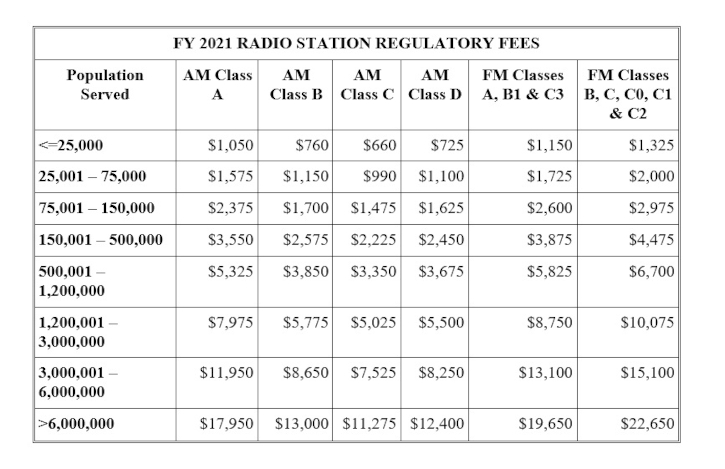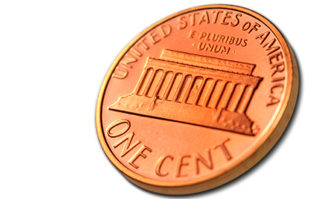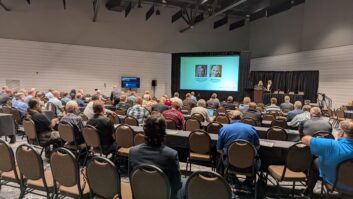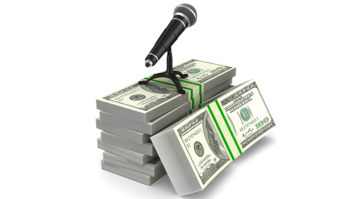
A proposed increase in the regulatory fees that radio licensees pay the Federal Communications Commission has sparked backlash from the industry and calls for the commission to revamp the process by which it establishes those such fees.
Broadcasters also are repeating their years-old argument that the FCC should also charge unregulated “Big Tech” fees for their use of spectrum.
The FCC in a Notice of Proposed Rulemaking proposed an average increase for radio stations for FY2021 of 8 percent, though some fees would climb by as much as 15%. Broadcasters view the increase as significant especially coming on the heels of a pandemic. The commission aims to collect $374 million from all the industries under its purview for the fiscal year that begins Oct. 1.
Filings by the National Association of Broadcasters and a joint filing by state broadcast associations complain of discrepancies in how the FCC calculates the fees it collects; and the broadcasters argue that the commission cannot justify the substantial increase in regulatory fees.
“For the third consecutive year, the commission plans to significantly increase regulatory fees for broadcasters to unfair, unsustainable levels, and in a manner that is unlawful and ignores the COVID-19 pandemic’s devastating economic impact on broadcasters,” NAB wrote in a filing in June.
The association believes the FCC failed to explain the basis for the proposed increases “in any meaningful way.” It also said it is “apparent that broadcasters are not being charged more in regulatory fees because of any increased costs or benefits of their regulation.”
Spread the Burden
The commission is required by Congress to assess regulatory fees each year in an amount that can reasonably be expected to equal the amount of its appropriation. The commission issues a NPRM yearly seeking comment on the proposal; it did that in May.
The FCC estimates that in fiscal 2021 it will collect approximately $20.1 million from FM stations in annual regulatory fees, and another $9.6 million from AM licensees. The fees are based on the size of market a station serves. In all, the FCC projects it needs to collect approximately $136 million from industries regulated by the Media Bureau, including radio and television licensees, to cover the costs of some 119 full-time bureau employees.

The proposed fee increase would mean a Class A AM station in a small market serving a population of under 25,000 would pay $1,050 in 2021 compared to $975 a year ago. The largest FM broadcasters in markets of 6 million or more people would pay a top fee of $22,650 this year compared to $20,925 in 2020.
The FCC’s NPRM asks whether it should extend the temporary measures it adopted last year to help businesses suffering financial hardships because of the pandemic. Those include allowing some payment deferrals at a discounted interest rate, and in some extreme cases, fee waivers.
NAB asked the FCC to take steps to require huge tech companies and other unlicensed spectrum users pay their fair share of the commission’s activities from which they directly benefit. It contends that some of the largest and wealthiest companies in the world leverage commission proceedings to develop profitable business models yet contribute no regulatory fees.
The NAB estimates that broadcasters use 0.07% of allotted spectrum but account for at least 16% of the FCC’s entire budget while offering a free service to the public.
“The commission is forcing broadcasters to subsidize the regulation of other entities that are either contributing less than their fair share of the fees; or allowed to free ride entirely on the commission’s activities,” it wrote.
Broadcasters typically pay their annual fee by the end of September unless granted a financial hardship waiver due to the pandemic. The FCC says it has the authority to charge a 25% late fee if necessary.
The NAB asked the FCC to issue a Further Notice about expanding the base of payers to include Big Tech so the fee system can reflect the work the commission performs and the entities that actually its resources and derive benefits.
“The substantial financial impact on broadcasters and other regulated entities of exempting such companies from regulatory fees certainly warrants further consideration,” Rick Kaplan, NAB general counsel, wrote in ex parte comments in the docket.
States Speak Up
NAB is not alone in making this argument. A joint comment filing from the 50 state broadcast associations says the industry “has been unfairly subsidizing its competitors through regulatory fees for almost 30 years.”
The associations pointed to a recent D.C. Circuit U.S. Court of Appeals decision, Telesat Canada vs. FCC. They said he court dismissed a non-U.S. licensed space stations’ challenge to the FCC decision to expand the base of regulatory fees to include such entities.
The associations said the FCC can no longer “robotically apply its outdated methodology for calculating the regulatory fee obligations of broadcasters.”
Observers note that the FCC has recently made changes to the satellite and earth station fee category, resulting in an increase in the fees charged to the satellite industry.
Advocates for broadcasters claim the appeals court decision makes it clear that the commission has the statutory authority to charge “Big Tech” regulatory fees.
“The FCC should begin the process of expanding its payor base to include unlicensed spectrum users that broadcasters and other licensees are currently forced to subsidize,” the NAB wrote in reply comments to the FCC’s NPRM.
The state associations also wrote that the Ray Baum Act (RBA) of 2018 makes clear that “benefits, rather than licenses, are the touchstone for assessing regulatory fees.”
“The RBA equipped the FCC with the flexible authority to assess and collect fees based on the benefit of the commission’s work, not on the increasingly arbitrary factors of whether the payor holds a license or how the commission has organized itself.
“However, each year, the FCC has continued to reject that notion, asserting that the fee assessment structure dictated by the statute fundamentally remains unchanged,” that state broadcasters wrote.
Individual state broadcaster associations have been communicating with the membership on the potential fallout of the regulatory fees increase.
Smaller Entities Hit?
The New York State Broadcasters Association stated on its website the FCC previously has exempted stations whose fees were $1,000 or less.
“Some stations, especially Class A AM stations, have historically been assessed a fee under $1,000, and therefore were exempt. With the new fee schedule, some stations that were exempt in past years could find they are no longer exempt and must pay a fee,” it wrote.
Oscar Rodriguez, president of the Texas Association of Broadcasters, wrote on its website: “TAB once again is pushing back on the FCC’s proposed regulatory fees for broadcasters, which continue to soar while tech giants like Microsoft and others skate free despite benefiting immensely from the federal agency’s decision-making.”
Since the FCC is required to collect the money by the end of the fiscal year, it has to collect the fees in September, according to attorneys familiar with the process.
“That means an order setting the fees normally is released in August,” said Scott Flick, partner at Washington-based Pillsbury Winthrop Shaw Pittman, who filed the reply comments on behalf of the 50 state broadcaster associations. “The FCC needs time to set up the fee database with the correct fee amounts before the filing window can be opened.”
Flick said payers also need notice in order to arrange for making the fee payments, particularly when the fees are higher than what they may have budgeted for.
Melodie Virtue, communications attorney with Foster Garvey, said she is doubtful of the prospects for the NAB petition: “I fear it will take an appeal to make the FCC budge on adjusting the annual regulatory fees imposed on broadcasters. The regulatory fee setting process is so interrelated among the various FCC bureaus, and since the FCC must collect by the end of September for the federal fiscal year, I don’t see any short-term resolution to this issue.”







